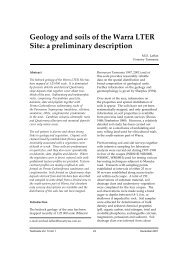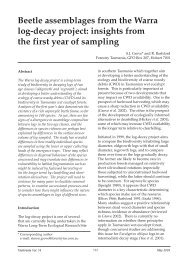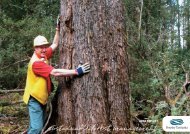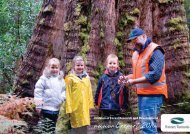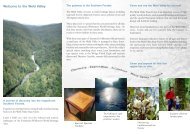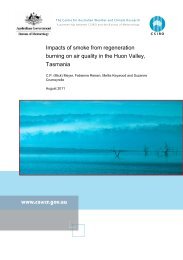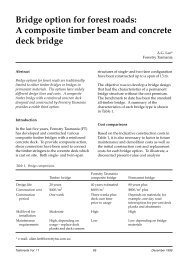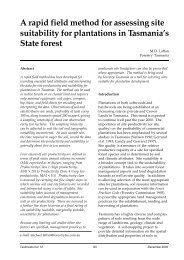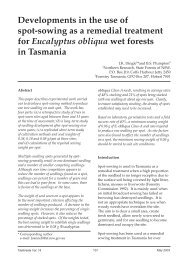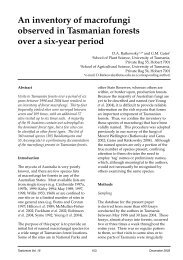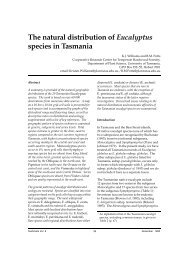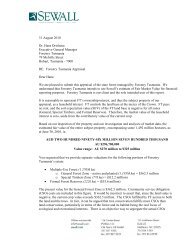Professor Ivan Tomaselli Report - Forestry Tasmania
Professor Ivan Tomaselli Report - Forestry Tasmania
Professor Ivan Tomaselli Report - Forestry Tasmania
Create successful ePaper yourself
Turn your PDF publications into a flip-book with our unique Google optimized e-Paper software.
them to be produced usually do not have market prices and are externalities for which the<br />
landowner, in whose lands the resources are found, is rarely compensated.<br />
In general terms the concept is that forest management and operations in production forests<br />
can be continuously improved. The review of documents, field observations and the<br />
discussions held during the visit clearly indicated that <strong>Forestry</strong> <strong>Tasmania</strong> has continuously<br />
invested to improve forest management practices, and this will contribute to further<br />
mitigate negative externalities and enhance positive externalities over time.<br />
In spite of its efforts it seems that <strong>Forestry</strong> <strong>Tasmania</strong> has not been fully recognized for the<br />
services provided to the society and for its contribution to improve social welfare at local<br />
and global levels. In fact the company has been criticized and has been forced to increase<br />
investments in research and reduce wood removals. So far wood is the only significant<br />
good that the company trades in the market and reduction on wood removals above certain<br />
levels can put at risk the economic sustainability of the business.<br />
In reality the pressure on the forest industry has been a global trend. It is growing over time<br />
in all parts of the world, especially for industry operating in natural forests. The forest<br />
industry has been asked to increase its contribution to welfare at local and global levels, and<br />
this is continuously reducing profitability, and this tends to make wood less competitive in<br />
the market.<br />
<strong>Forestry</strong> <strong>Tasmania</strong> manages State Forests, including natural forests with important aesthetic<br />
and cultural values for the local society. These aspects, combined with the fact that local<br />
society has achieved a high cultural, socio and economic development stage, tend to<br />
increase the demand for the contribution to the local and global social welfare. Within this<br />
context the <strong>Forestry</strong> <strong>Tasmania</strong> Board seeks to respond to society demands, while at the<br />
same time find ways to mitigate impacts of new demands on the business, and keep<br />
operations profitable to ensure the company’s sustainability.<br />
3- NEW SILVICULTURE APPLIED TO OLD GROWTH FORESTS<br />
The new silviculture applied by <strong>Forestry</strong> <strong>Tasmania</strong> to manage old growth forests was<br />
presented to the consultant based on documents, presentations made by the staff and field<br />
visits. The new silviculture is in response to the local society demands and, at the same<br />
time, maintains timber production in the old growth forests.<br />
In developing alternatives to the clearfell, burn and sow (CBS) practice in old growth<br />
forests, <strong>Forestry</strong> <strong>Tasmania</strong> has considered a set of performance criteria agreed with the<br />
Government of <strong>Tasmania</strong> when the request for advice on management of old growth forest<br />
was made. The set of criteria included the following:<br />
i. Maintenance of a minimum supply level of 300 thousand cubic meters per year of<br />
high quality eucalypt veneer and sawlog material;<br />
ii.<br />
Maintenance of contracted commitments;<br />
5 5




